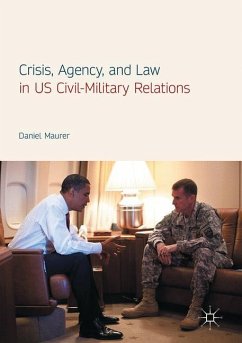This book develops a responsible and practical method for evaluating the success, failure, or "crisis" of American civil-military relations among its political and uniformed elite. The author's premise is that currently there is no objectively fair way for the public at large or the strategic-level elites to assess whether the critical and often obscured relationships between Generals, Admirals, and Statesmen function as they ought to under the US constitutional system. By treating these relationships-in form and practice-as part of a wider principal (civilian)-agency (military) dynamic, the book tracks the "duties"-care, competence, diligence, confidentiality, scope of responsibility-and perceived shortcomings in the interactions between US civilian political authorities and their military advisors in both peacetime and in war.
Bitte wählen Sie Ihr Anliegen aus.
Rechnungen
Retourenschein anfordern
Bestellstatus
Storno








